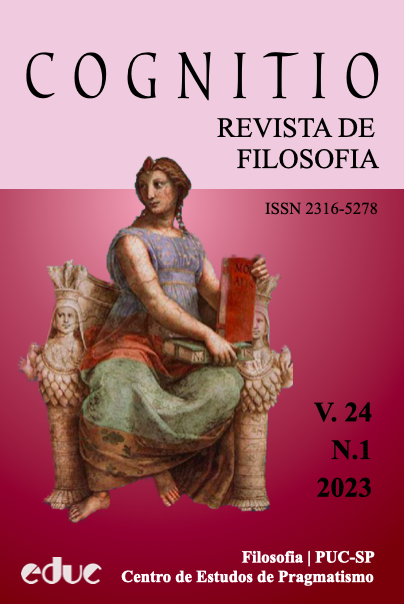Historicismo e naturalismo em Dewey
a reconstrução da filosofia
DOI:
https://doi.org/10.23925/2316-5278.2023v24i1:e61844Resumo
O presente artigo analisa o projeto filosófico de John Dewey (1859-1952) que consta de uma crítica radical à epistemologia tradicional a partir da concepção pragmatista de experiência. O status científico da filosofia, conforme Dewey, não exigirá uma teoria científica passível de prova, mas um programa metafísico construído a partir de lógicas situacionais. O presente artigo apresenta as dimensões históricas e científicas da metafísica empírica de Dewey, argumentando a favor da articulação entre as duas abordagens que configuram o projeto de reconstrução da filosofia. Dewey compreende que a busca dos fundamentos últimos tornou a filosofia prisioneira de uma imagem da mente como construtora de representações - algumas exatas, outras não, mas todas com a pretensão de serem estudadas por meio de métodos puros, não empíricos. Diferentemente dessa tradição que supõe uma ideia de superioridade intelectual do saber, revelado por meio de métodos não empíricos, Dewey argumenta a favor do empírico em filosofia e se coloca contra uma comum concepção da realidade como segura, regular e acabada.
Palavras Chave: Experiência. Natureza. Metafísica empírica. Reconstrução filosófica.
Referências
ARAÚJO. Inês Lacerda. Dewey e Rorty: Um debate sobre a justificação, experiência e o papel da ciência na cultura. Cognitio-estudos: Revista Eletrônica de Filosofia, v. 5, n. 1, jan./jun., 2008.
DEWEY, John. Art as Experience. The Berkley Publishing group. New York: Pequin Group (USA), 1934.
DEWEY, John. Essays in Experimental Logic. 2 ed. Chicago: Chicago University Press, 2004.
DEWEY, John. Experience and Nature. New York: Dover Publications, Inc., 1958.
DEWEY, John. Human Nature and Conduct: An Introduction to Social Psychology. New York: Cosimo, 2007.
DEWEY, John. How We Think. New York: Forgotten Books, 1909.
DEWEY, John. Individuality and experience. In: Later works of John Dewey. Carbondale: Southern Illinois
University Press, 1984. v. 2, p. 55-61.
DEWEY, John. Logic: The Theory of Inquiry. New York: Henry Holt and company, 1938.
DEWEY, John. Reconstruction in Philosophy. Enlarged edition. With a new introduction by the Author. Bos- ton: The Beacon Press, 1957.
DEWEY, John. Studies in Logical Theory. Chicago: University of Chicago Press, 1903.
DEWEY, John. The crucial role of intelligence. In: Later works of John Dewey. Carbondale: Southern Illinois
University Press, 1987. p. 342-344.
DEWEY, John. The Essencial Dewey. New York: Ed. Larry Hickman and Tomas Alexander. Bloomington, 1998.
DEWEY, John. The influence of Darwin on philosophy. New York: Henry Holt and Company, 1910.
DEWEY, John. The quest for Certainty: a study of the relation of knowledge and action. Minton, Balch, 1929.
GEIGER, G. R. John Dewey in Perspective: a reassessment. N. York; Toronto; London: McGraw-Hill Book Co., 1958.
GOUINLOCK, James. What The Legacy instrumentalism?: Rorty’s Interpretation of Dewey. In. SAAT- KAMP JR., H. J. (ed.). Rorty and pragmatism: The philosopher responds to his critics. Nashville and London: Vanderbilt University Press, 1995.
HEIDEGGER, M. Basic Writings by Martin Heidegger. KRELL, David., New York, 1977, p. 235.
PINTO, Paulo Roberto Margutti. A abordagem pragmática do conhecimento. In: A ciência e seus impasses:
debates e tendências em filosofia, ciências sociais e saúde. Rio de Janeiro: Editora Fiocruz, 1999.
Downloads
Publicado
Como Citar
Edição
Seção
Licença
Copyright (c) 2023 http://creativecommons.org/licenses/by/4.0/

Este trabalho está licenciado sob uma licença Creative Commons Attribution 4.0 International License.









